Chromium(VI) oxide for synthesis
Merck KGaA
Revision date : 2021-09-22
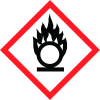
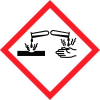
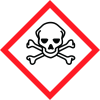
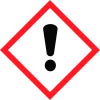
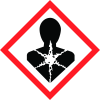
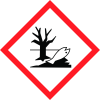
Note: Ingredients listed on restricted chemical lists
EC/CAS
1333-82-0
Name of the chemical
Chromium trioxide
Concentration
N/A
EC/CAS
215-607-8
Name of the chemical
Chromium trioxide
Concentration
N/A
General Information
Revision date
2021-09-22
Product name
Chromium(VI) oxide for synthesis
CAS No.
1333-82-0
REACH No
01-2119458868-17-XXXX
Emergency telephone
+(44)-870-8200418 (CHEMTREC (GB
Icons in SDS
Company Information
Company name
Merck KGaA
E-mail address of the competent person responsible for the Safety Data Sheet
TechnicalService@merckgroup.com
GHS Information
Signal word
Danger
Hazard Codes
Hazard statements (CLP)
H271, H301, H301+H311, H311, H314, H317, H318, H330, H334, H335, H340, H350, H361f, H372, H400, H410
Hazard statements
Code
Statements
H271
May cause fire or explosion; strong oxidiser
H301
Toxic if swallowed
H301+H311
Toxic if swallowed or in contact with skin
H311
Toxic in contact with skin
H314
Causes severe skin burns and eye damage
H317
May cause an allergic skin reaction
H318
Causes serious eye damage
H330
Fatal if inhaled
H334
May cause allergy or asthma symptoms or breathing difficulties if inhaled
H335
May cause respiratory irritation
H340
May cause genetic defects
H350
May cause cancer
H361f
Suspected of damaging fertility
H372
Causes damage to organs through prolonged or repeated exposure
H400
Very toxic to aquatic life
H410
Very toxic to aquatic life with long lasting effects
Precautionary statements
Code
Statements
P210
Keep away from heat, hot surface, sparks, open flames and other ignition sources. - No smoking.
P260
Do not breathe dust/fume/gas/mist/vapors/spray.
P280
Wear protective gloves/protective clothing/eye protection/face protection.
P303+P361+P353
IF ON SKIN (or hair): Take off Immediately all contaminated clothing. Rinse SKIN with water [or shower].
P305+P351+P338
IF IN EYES: Rinse cautiously with water for several minutes. Remove contact lenses if present and easy to do - continue rinsing.
Section 2
CLP CLASSIFICATION
Oxidizing solids (Category 1), H271 Acute toxicity, Oral (Category 3), H301 Acute toxicity, Inhalation (Category 2), H330 Acute toxicity, Dermal (Category 3), H311 Skin corrosion (Sub-category 1A), H314 Serious eye damage (Category 1), H318 Respiratory sensitization (Category 1), H334 Skin sensitization (Category 1), H317 Germ cell mutagenicity (Category 1B), H340 Carcinogenicity (Category 1A), H350 Reproductive toxicity (Category 2), H361f Specific target organ toxicity - single exposure (Category 3), Respiratory system, H335 Specific target organ toxicity - repeated exposure (Category 1), H372 Short-term (acute) aquatic hazard (Category 1), H400 Long-term (chronic) aquatic hazard (Category 1), H410 For the full text of the H-Statements mentioned in this Section, see Section 16.
2.2 Label elements
Labelling according Regulation (EC) No 1272/2008
Signal word
Danger Danger
Hazard statements
H271 May cause fire or explosion; strong oxidizer. H301 + H311 Toxic if swallowed or in contact with skin. H314 Causes severe skin burns and eye damage. H317 May cause an allergic skin reaction. H330 Fatal if inhaled. H334 May cause allergy or asthma symptoms or breathing difficulties if inhaled. H335 May cause respiratory irritation. H340 May cause genetic defects. H350 May cause cancer. H361f Suspected of damaging fertility. H372 Causes damage to organs through prolonged or repeated exposure. H410 Very toxic to aquatic life with long lasting effects. Restricted to professional users. Reduced Labeling (<= 125 ml) H271 May cause fire or explosion; strong oxidizer. H350 May cause cancer. H340 May cause genetic defects. H330 Fatal if inhaled. H372 Causes damage to organs through prolonged or repeated exposure. H334 May cause allergy or asthma symptoms or breathing difficulties if inhaled. H317 May cause an allergic skin reaction. H314 Causes severe skin burns and eye damage. H361f Suspected of damaging fertility. H301 + H311 Toxic if swallowed or in contact with skin.
Precautionary statements
P210 Keep away from heat, hot surfaces, sparks, open flames and other ignition sources. No smoking. P260 Do not breathe dust/ fume/ gas/ mist/ vapors/ spray. P280 Wear protective gloves/ protective clothing/ eye protection/ face protection/ hearing protection. P303 + P361 + P353 IF ON SKIN (or hair): Take off immediately all contaminated clothing. Rinse skin with water. P304 + P340 + P310 IF INHALED: Remove person to fresh air and keep comfortable for breathing. Immediately call a POISON CENTER/ doctor. P305 + P351 + P338 IF IN EYES: Rinse cautiously with water for several minutes. Remove contact lenses, if present and easy to do. Continue rinsing. P210 Keep away from heat, hot surfaces, sparks, open flames and other ignition sources. No smoking. P260 Do not breathe dust/ fume/ gas/ mist/ vapors/ spray. P280 Wear protective gloves/ protective clothing/ eye protection/ face protection/ hearing protection. P303 + P361 + P353 IF ON SKIN (or hair): Take off immediately all contaminated clothing. Rinse skin with water. P304 + P340 + P310 IF INHALED: Remove person to fresh air and keep comfortable for breathing. Immediately call a POISON CENTER/ doctor. P305 + P351 + P338 IF IN EYES: Rinse cautiously with water for several minutes. Remove contact lenses, if present and easy to do. Continue rinsing.
Supplemental label elements
none none
2.3 Other hazards
This substance/mixture contains no components considered to be either persistent, bioaccumulative and toxic (PBT), or very persistent and very bioaccumulative (vPvB) at levels of 0.1% or higher.

